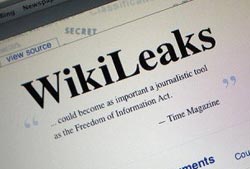WikiLeaks: Israel plans to counter Iran's nuke program
Thousands of classified U.S. diplomatic cables, released by the whistle-blowing website WikiLeaks on Sunday, expose the concerns of Israel's decision-makers over Iran's nuclear program and ideas meant to thwart it.
|
Don't miss |
 |
Iran insists that its nuclear program is for civilian use, while Israel and Washington reject such claims as a guise for developing nuclear weapons. The Jewish state sees a nuclear Iran as a threat to its very existence and has refused to rule out the possibility of launching a military strike against its nuclear facilities.
Israeli Prime Minister Benjamin Netanyahu said Monday that the leaked documents boost Israel's position on the Iran issue. "The documents show many sources backing Israel's assessments, particularly of Iran," local daily Ha'aretz quoted the prime minister as saying before a group of editors in Tel Aviv.
Recent revelations by the WikiLeaks disclosed that leaders of some Arab states, in the past years, had urged the United States to attack Iran's nuclear facilities.
According to a cable sent from the U.S. Embassy in Tel Aviv to Washington on June 2, 2009, Israel considered 2010 as a "critical year" for preemptively striking Tehran's nuclear installations.
The cable summarizes a meeting held in Tel Aviv between Israeli Defense Minister Ehud Barak and U.S. congressmen, during which Barak estimated there was a window of "between six to 18 months from now, in which stopping Iran from acquiring nuclear weapons might still be viable."
After that, Barak told his guests that "any military solution would result in unacceptable collateral damage."
U.S. officials, while listening attentively to Israeli assessments, had their skepticism. "It is unclear if the Israelis are using worst-case estimates to raise greater urgency from the United States," opined one U.S. diplomat in a leaked communication.
Meanwhile, other cables published by Britain's Guardian newspaper on Sunday, show outgoing Mossad chief Meir Dagan's central involvement in contacts with the U.S. administration regarding Tehran.
A secret cable from March 2005 summarizes a meeting between the head of the Israeli spy agency and a U.S. congressman in which the former noted that the U.S. and Israeli assessments of Iran's intentions and plans are "largely in accord."
Dagan had also predicted that the European Union dialogue with Iran "will not succeed and that the issue of Iran's nuclear ambitions would eventually go to the UN Security Council."
In a meeting with U.S. undersecretary of state Nick Burns held in August 2007, Dagan reviewed Israel's five-pillar strategy on countering Iran, highlighted by inducing a regime change. Dagan, relayed the cable, said he was sure that Israel and the United States could "change the ruling regime in Iran " by doing more to "develop the identities of ethnic minorities" in the country.
 0
0 







Go to Forum >>0 Comments